-
ORIGINAL ARTICLE01-30-2023
Educational material production and validity: educational instrument for home care for premature newborns
Revista Brasileira de Enfermagem. 2023;76(1):e20210648
Abstract
ORIGINAL ARTICLEEducational material production and validity: educational instrument for home care for premature newborns
Revista Brasileira de Enfermagem. 2023;76(1):e20210648
DOI 10.1590/0034-7167-2021-0648
Views0See moreABSTRACT
Objective:
to produce and validate a booklet, based on Jean Watson’s Theory, on home care for premature newborns, based on caregivers’ experiences.
Method:
a methodological study, developed in the following stages: diagnosis of knowledge needs about home care; survey of scientific content; educational material production; and validity by judges/experts.
Results:
the literature review resulted in 19 articles. The main themes (breastfeeding, bath care, bond building, infection prevention and support network) were listed for producing the booklet “Booklet for Premature Newborns: Demystifying Home Care”. The booklet content and appearance received the overall Content Validity Index of 0.85, considered suitable within the scientific rigor of validity.
Final considerations:
the booklet produced and validated is an educational material whose main role is to provide knowledge and awaken caregivers’ autonomy in providing home care to newborns.
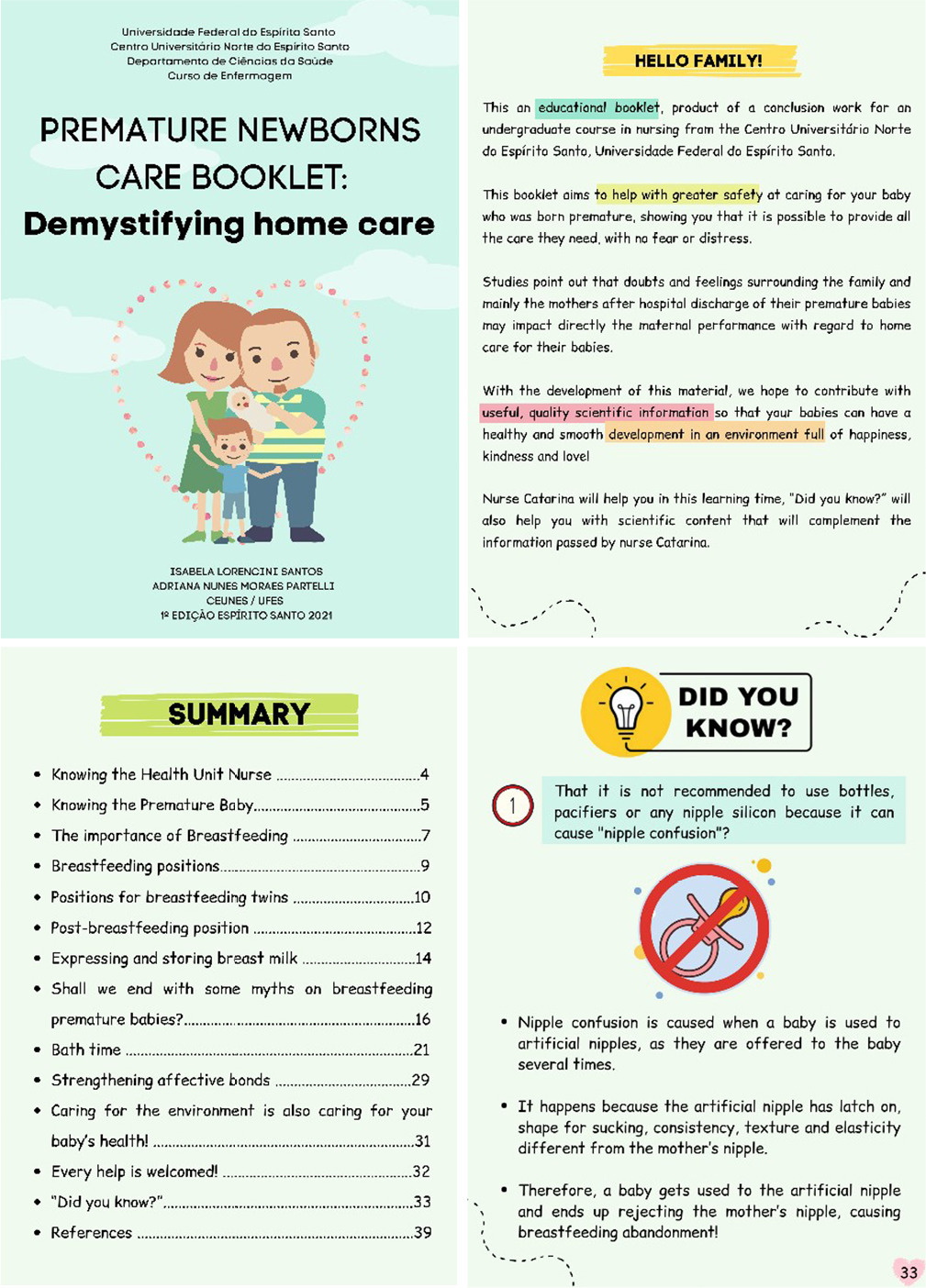
-
01-30-2023
Acurácia do diagnóstico de enfermagem desobstrução ineficaz de vias aéreas em pacientes de unidade de terapia intensiva
Revista Brasileira de Enfermagem. 2023;76(1):e20220174
Abstract
Acurácia do diagnóstico de enfermagem desobstrução ineficaz de vias aéreas em pacientes de unidade de terapia intensiva
Revista Brasileira de Enfermagem. 2023;76(1):e20220174
DOI 10.1590/0034-7167-2022-0174
Views0See moreRESUMEN
Objetivos:
analizar la precisión de indicadores clínicos de limpieza ineficaz de las vías aéreas en pacientes de unidades de cuidados intensivos adulto.
Métodos:
estudio de precisión diagnóstica en unidad de cuidados intensivos de hospital universitario en noreste brasileño. Muestra de 104 pacientes hospitalizados entre junio y octubre de 2019.
Resultados:
prevalencia de limpieza ineficaz de las vías aéreas del 36,54%. Indicadores con alta especificidad; ausencia de tos (0,8326), ortopnea (0,6817), ruidos respiratorios adventicios (0,8175) y ruidos respiratorios disminuidos (0,8326). Indicadores clínicos con alta sensibilidad y especificidad; cambio en la frecuencia respiratoria (0,9999) y cambio en el patrón de respiración (0,9999).
Conclusiones:
seis indicadores clínicos proporcionaron identificación precisa de la limpieza ineficaz de las vías aéreas; cambio en la frecuencia respiratoria y cambio en el patrón de respiración fueron los más precisos para pacientes críticos. Nuestros hallazgos contribuyen a inferencias diagnósticas precisas y la prevención de complicaciones respiratorias en estos pacientes.
-
REVIEW01-30-2023
Transition from parents to caregivers of a child with type 1 Diabetes Mellitus: a scoping review
Revista Brasileira de Enfermagem. 2023;76(1):e20220201
Abstract
REVIEWTransition from parents to caregivers of a child with type 1 Diabetes Mellitus: a scoping review
Revista Brasileira de Enfermagem. 2023;76(1):e20220201
DOI 10.1590/0034-7167-2022-0201
Views0See moreABSTRACT
Objectives:
to map and summarize the existing scientific evidence on parents’ transition experience to exercise the caregiver role of a child with 1DM, identifying gaps in knowledge of this experience.
Methods:
a scoping review was carried out based on JBI methodology, in two databases, following the Preferred Reporting Items for Systematic Reviews and Meta-Analyses extension for Scoping Reviews checklist.
Results:
we included 31 articles. From the studies, constitutive elements of parents’ transition experience to caregiver role of a child with 1DM were found, which focused on the nature of the experience, the feelings and emotions experienced, the hindering conditions, the facilitating conditions, the strategies used by parents and the results or effects obtained.
Final considerations:
the transition process’ characterizing elements were identified, but not a theoretical explanation of it. Additional research should be carried out in order to allow a deeper understanding of this process.
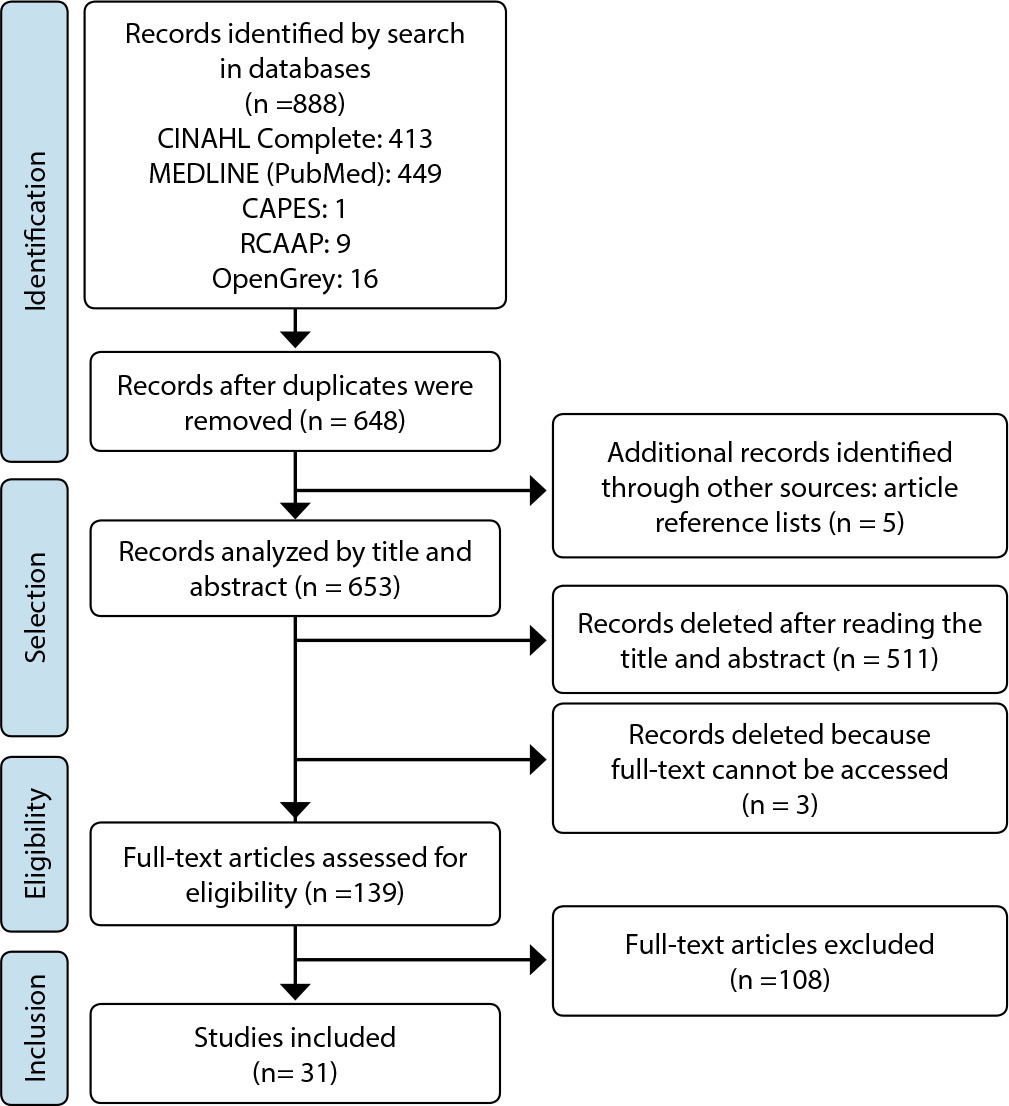
-
ORIGINAL ARTICLE01-30-2023
Development and content validity of a website for patients with coronary artery disease
Revista Brasileira de Enfermagem. 2023;76(1):e20220302
Abstract
ORIGINAL ARTICLEDevelopment and content validity of a website for patients with coronary artery disease
Revista Brasileira de Enfermagem. 2023;76(1):e20220302
DOI 10.1590/0034-7167-2022-0302
Views0See moreABSTRACT
Objectives:
to develop and analyze content validity evidence of a website for patients with coronary artery disease.
Methods:
a methodological study, carried out in the phases: Definition – determined contents for inclusion in the website, architecture and design; Implementation – subjects included in the website; Assessment – website submitted to analysis by 13 experts and eight laypersons regarding organization, content and design, on a scale of 1 (no agreement) to 4 (complete agreement). Items that reached Content Validity Ratio (CVR) higher than the established critical values and Content Validity Index greater than 0.80 were considered valid.
Results:
eight domains related to secondary prevention in coronary heart disease were included on the website. Critical CVR and adequate CVI were obtained according to professional and lay experts.
Conclusions:
the website was developed, achieving adequate content validity evidence, and can be used as an educational tool for this population.
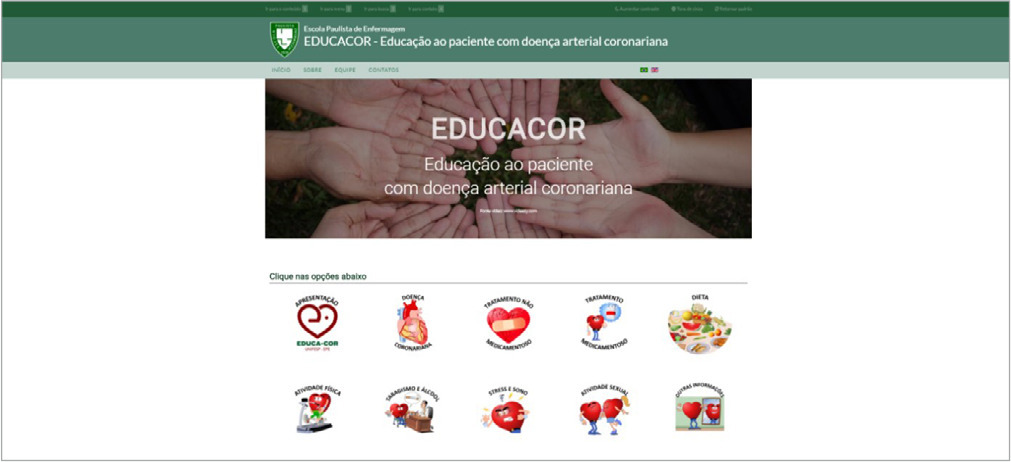
-
ERRATUM01-06-2023
ERRATUM
Revista Brasileira de Enfermagem. 2023;76(2):e2023n2e01
Abstract
ERRATUMERRATUM
Revista Brasileira de Enfermagem. 2023;76(2):e2023n2e01
DOI 10.1590/0034-7167.20237601e01
Views0In the article “Development and validity of an educational folder for pulmonary tuberculosis sputum collection”, with DOI number: , published in Revista Brasileira de Enfermagem, 2023;76(1):e202220194, on page 8:Delete:[…]See more -
ERRATUM12-02-2022
ERRATUM
Revista Brasileira de Enfermagem. 2022;75(4):e2022n4e06
Abstract
ERRATUMERRATUM
Revista Brasileira de Enfermagem. 2022;75(4):e2022n4e06
DOI 10.1590/0034-7167.20227504e06
Views0In the article “Effects of multidisciplinary rounds and checklist in an Intensive Care Unit: a mixed methods study”, with DOI number: ”;, published in Revista Brasileira de Enfermagem, 2022;75(3):e20210934, in the abstract:Where it read:[…]See more -
ORIGINAL ARTICLE11-29-2022
Outlining the therapeutic itineraries of children with disabilities in the professional health care subsystem
Revista Brasileira de Enfermagem. 2022;75(3):e20210169
Abstract
ORIGINAL ARTICLEOutlining the therapeutic itineraries of children with disabilities in the professional health care subsystem
Revista Brasileira de Enfermagem. 2022;75(3):e20210169
DOI 10.1590/0034-7167-2021-0169
Views0See moreABSTRACT
Objectives:
to identify the outlining of therapeutic itineraries of families of children with disabilities in the professional health care subsystem.
Methods:
qualitative research carried out in two specialized services in the state of Ceará, with 41 family members interviewed using the life path technique and reports submitted to descending hierarchical classification and similitude analysis, with the help of the IRaMuTeQ software and the theoretical framework of health care systems.
Results:
the classes described the families’ itineraries in five paths, related to faith, support structures, medical behaviors, professionals, and health services. The professional subsystem stood out as deficient in outlining the therapeutic itinerary for access to health care for children with disabilities, without promoting integration between services in the Care Network.
Final considerations:
the families’ therapeutic itineraries showed homogeneous discourse with themes related to the care of professionals and spiritual aspects.
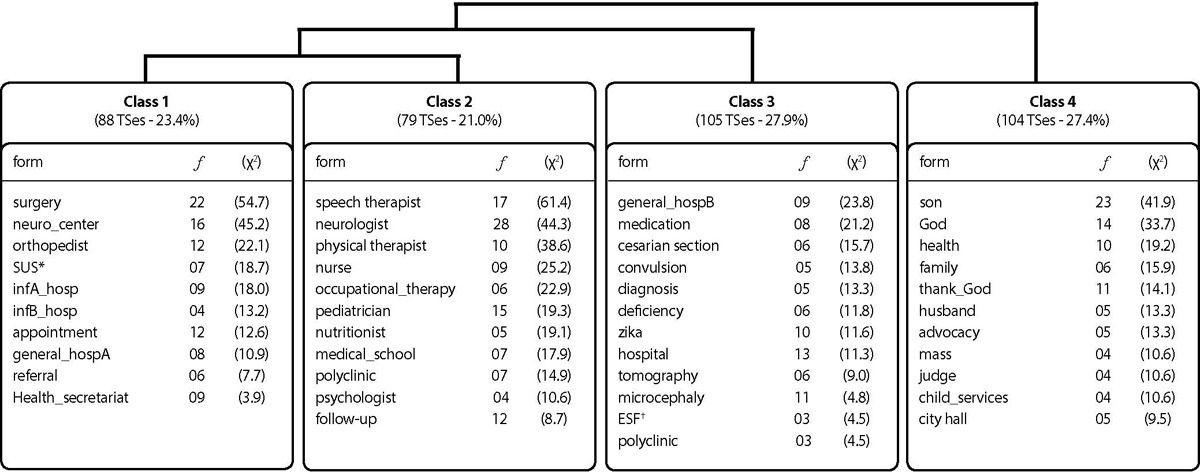
-
ORIGINAL ARTICLE11-29-2022
Ergonomics of anatomical bra models for breastfeeding: a contribution of nursing
Revista Brasileira de Enfermagem. 2022;75(3):e20210264
Abstract
ORIGINAL ARTICLEErgonomics of anatomical bra models for breastfeeding: a contribution of nursing
Revista Brasileira de Enfermagem. 2022;75(3):e20210264
DOI 10.1590/0034-7167-2021-0264
Views0See moreABSTRACT
Objectives:
to analyze the ergonomics of two models of breastfeeding bras.
Methods:
descriptive study carried out with 152 infants in a Brazilian university hospital. The prototypes were separated into two groups (A and B). To compare the two bra models, the Odds Ratio (OR) was used as a measure of the strength of the association. In subjective perceptions, the Modified Borg Scale, and the chi-square test of independence (χ2) were used. To compare the two prototypes, the Z test and logistic regression analysis were performed. A significance level of 5% was considered.
Results:
the bra in group B was more suitable for ergonomics of physical and psycho-aesthetic comfort than the bra in group A (p < 0.0001), according to the logistic regression tests.
Conclusions:
modeling B was ergonomically adequate, with usability and evaluation criteria centered on breastfeeding women.
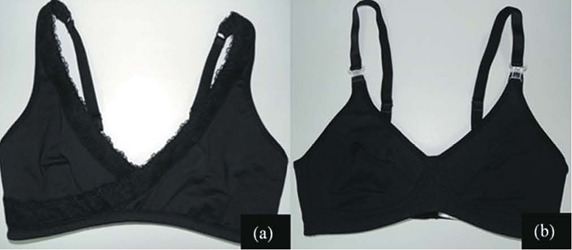
Search
Search in:
Nuvem de Tags
Adolescente (85) Atenção Primária à Saúde (239) COVID-19 (91) Criança (91) Cuidados de Enfermagem (269) Educação em Enfermagem (151) Educação em Saúde (139) Enfermagem (930) Enfermagem Pediátrica (86) Estudantes de Enfermagem (77) Estudos de Validação (131) Família (87) Idoso (208) Promoção da Saúde (99) Qualidade de Vida (104) Saúde do Trabalhador (86) Saúde Mental (145) Saúde Pública (82) Segurança do Paciente (150) Tecnologia Educacional (100)



